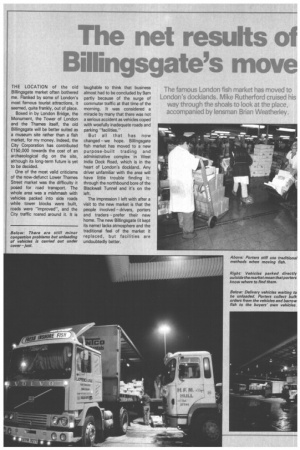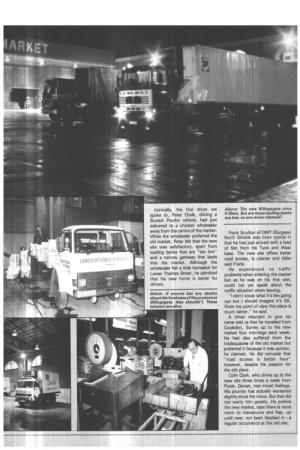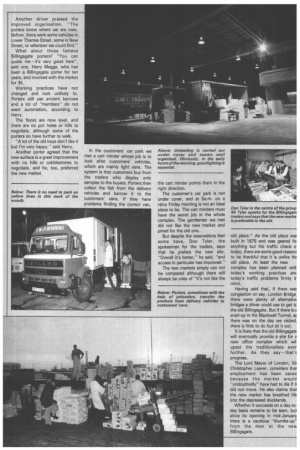The net results of Billingsgate's move
Page 46

Page 47

Page 48

If you've noticed an error in this article please click here to report it so we can fix it.
THE LOCATION of the old Billingsgate market often bothered me. Flanked by some of London's most famous tourist attractions, it seemed, quite frankly, out of place.
Boxed in by London Bridge, the Monument, the Tower of London and the Thames itself, the old Billingsgate will be better suited as a museum site rather than a fish market, for my money. Indeed, the City Corporation has contributed £150,000 towards the cost of an archaeological dig on the site, although its long-term future is yet to be decided.
One of the most valid criticisms of the now-defunct Lower Thames Street market was the difficulty it posed for road transport. The whole area was a mishmash with vehicles packed into side roads while tower blocks were built, roads were "improved", and the City traffic roared around it. It is laughable to think that business almost had to be concluded by 9am partly because of the surge of commuter traffic at that time of the morning. It was considered a miracle by many that there was not a serious accident as vehicles coped with woefully inadequate roads and parking "facilities."
But all that has now changed — we hope. Billingsgate fish market has moved to a new purpose-built trading and administrative complex in West India Dock Road, which is in the heart of London's dockland. Any driver unfamiliar with the area will have little trouble finding it: through the northbound bore of the Blackwell Tunnel and it's on the left.
The impression I left with after a visit to the new market is that the people involved — drivers, porters and traders — prefer their new home. The new Billingsgate (it kept its name) lacks atmosphere and the traditional feel of the market it replaced, but facilities are undoubtedly better. Ironically, the first driver we spoke to, Peter Chalk, driving a Buxted Poultry vehicle, had just delivered to a chicken wholesaler away from the centre of the market. While the wholesaler preferred the old market, Peter felt that the new site was satisfactory, apart from loading banks that are "too low" and a narrow gateway that leads into the market. Although the wholesaler felt a little homesick for Lower Thames Street, he admitted that his new home is better for drivers. Frank Scullion of DMT (Burgess) North Shields was more typical in that he had just arrived with a load of fish from his Tyne and Wear base. The new site offers better road access, is cleaner and tidier said Frank.
He experienced no traffic problems when entering the market but as he was on his first visit, could not yet speak about the traffic situation when leaving.
"I don't know what it's like going out but I should imagine it's OK. From my point of view this place is much better," he said.
A driver reluctant to give his name told us that he travelled from Coulsdon, Surrey up to the new market four mornings each week. He had also suffered from the inadequacies of the old market but preferred it because it was quicker, he claimed. He did concede that "road access is better here" however, despite his passion for the old place.
Colin Clark, who drives up to the new site three times a week from Poole, Dorset, had mixed feelings. His journey has actually worsened slightly since the move. But that did not worry him greatly. He prefers the new market, says there is more room to maneouvre and has, up until now, not been blocked in —a regular occurrence at the old site. Another driver praised the improved organisation. "The porters know where we are now, Before, there were some vehicles in Lower Thames Street, some in New Street, or wherever we could find."
What about those famous Billingsgate porters? "You can quote me —it's very good here", said one, Harry Meggs, who has been a Billingsgate porter for ten years, and involved with the market for 35.
Working practices have not changed and look unlikely to. Porters still use ancient barrows and a lot of "members" do not want automation, according to Harry, The floors are now level, and there are no pot holes or hills to negotiate, although some of the porters do have further to walk.
"A lot of the old boys don't like it but I'm very happy," said Harry.
Another porter agreed that the new surface is a great improvement with no hills or cobblestones to negotiate, and he, too, preferred the new market, In the customers' car park we met a cart minder whose job is to look after customers' vehicles, which are mainly light vans. The system is that customers buy from the traders who display only samples to the buyers. Porters then collect the fish from the delivery vehicles and barrow it to the customers' vans. If they have problems finding the correct van, the cart minder points them in the right direction.
The customer's car park is not under cover, and at 5a.m. on a rainy Friday morning is not an ideal place to be. The cart minders must have the worst job in the whole complex. The gentleman we met did not like the new market and pined for the old one.
But despite the reservations that some have, Don Tyler, the spokesman for the traders, says that he prefers the new site. "Overall it's better," he said, "and access in particular has improved."
The two markets simply can not be compared although there will always be cries of "It's not like the old place." As the old place wa5 built in 1875 and was geared foi anything but the traffic chaos a today, there are some good reason; to be thankful that it is unlike thE old place. At least the new complex has been planned witt today's working practices anc today's traffic problems firmly ir mind.
Having said that, if there wa: congestion on say, London Bridge, there were plenty of alternativE bridges a driver could use to get tc the old Billingsgate. But if there is z snarl-up in the Blackwell Tunnel, at there was on the day we visited, there is little to do but sit it out.
It is likely that the old BillingsgatE will eventually provide a site for a new office complex which wil upset the traditionalists even further, As they say — that'z progress.
The Lord Mayor of London, Sir Christopher Leaver, considers that employment has been saved because the market would "undoubtedly" have had to die if it did not move. He also claims that the new market has breathed life into the depressed docklands.
Whether it succeeds on a day-today basis remains to be seen, but since its opening in mid-January there is a cautious "thumbs-up" from the men at the new Billingsgate.




































































